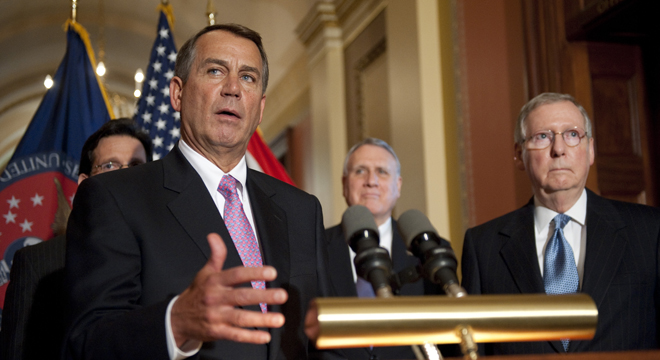House Republicans are poised to advance legislation this week to repeal President Obama’s Medicare cost-cutting board, a provision enacted in the health care reform law. The Energy & Commerce Committee is set to mark it up this Wednesday, and the repeal bill already has enough cosponsors to pass the House. It’s not expected to survive the Senate or Obama’s veto pen, but the debate over this provision cuts to the heart of the battle over how to save Medicare in the long run.
Some background: The Independent Payment Advisory Board (IPAB) is set to take effect in 2014, and would comprise 15 President-appointed and Senate-confirmed experts charged with holding down Medicare per-beneficiary spending by restricting reimbursements to providers. It is forbidden from cutting payments to beneficiaries. Congress can override the panel is by passing an alternate way to save the same amount of money, or with a three-fifths Senate majority. The health care industry has been outspoken in its hatred for IPAB. Republicans are united in their effort to kill it, and even some House Dems are on that page.
The question now is: Why is the party that’s hell-bent on reining in Medicare pushing to repeal this powerful tool for doing just that? Part of it is to score political points by slicing off a key piece of the Affordable Care Act. But more importantly, Republicans don’t want to keep Medicare in its current form. Many of them don’t think that’s feasible. They want to transition it to a privatized model a la the Paul Ryan plan, where seniors get a fixed subsidy — or “premium support” — to buy their own insurance on a private exchange.
With Medicare costs exploding and the trust fund set to be depleted by 2024, the two parties increasingly agree that the program’s per-beneficiary spending ought to be held down to roughly per-capita GDP plus 1 percent, a significant cut from projections. The disagreement is on how to get there. Republicans want to achieve that by reducing benefits and reshaping Medicare itself; Democrats believe that money can be saved by cutting improper or unnecessary payments to providers.
Republican Sens. Tom Coburn (OK) and Richard Burr (NC) recently unveiled a plan to transition Medicare to a “premium support” model with larger subsidies than the Ryan budget — and repeal IPAB immediately. “One thing that we do in this bill right up front is we eliminate IPAB,” Burr said. “We believe that the way you get efficiencies in health care is structural changes — it’s not an independent board that sets or cuts reimbursement or scope of coverage.”
That’s why the debate over IPAB is more important than meets the eye: it’s the best idea Democrats have come up with to keep Medicare alive over time in its existing “defined benefit” structure. IPAB is their most credible weapon against the push to move to a voucher system. But repealing it adds momentum to the increasingly industry-backed GOP push for a “defined contribution” model that ends the coverage guarantee for America’s seniors.
Rep. Phil Roe (R-TN), the chief sponsor of the repeal bill, has warned that IPAB could become another Sustainable Growth Rate (SGR) — the dreaded “doc fix” problem — by setting in motion provider pay cuts that would have a destabilizing effect on the health care system, and which Congress wouldn’t let go into effect. His bill has 224 cosponsors, including over a dozen Democrats. Partner legislation in the Senate has a number of signatories, all Republicans.
TPM asked Coburn whether IPAB could achieve the basic goal of holding down Medicare spending. “You can do it that way. That’s right,” he said. “But remember what that does — that puts the government right in between you and the decisions made very personally by you and your caregiver… And so I reject that way.”
That’s where the great divide lies. It’s a foregone conclusion that health care services will have to be rationed in order to save money. The question is who does the rationing: a government-sponsored independent panel or private insurance companies.
Democrats currently have the advantage because unlike the GOP plan, IPAB is already signed into law. But there’s a potentially fatal flaw in their plan: Senate Republicans have already threatened to filibuster confirmation of any members to the panel. So unless Democrats defend the need for the IPAB and persuade the public that the alternative is a Ryan-style plan that privatizes Medicare, it’s going to be a tough slog to keep traditional Medicare around over the long run. So far neither Obama nor congressional Democrats have talked much about IPAB.
That’s why moves like Wednesday’s markup — and the eventual, expected House passage of IPAB repeal — serve as an ominous sign for those who don’t want to drastically alter Medicare’s structure. Republicans are playing the long game, attacking IPAB while introducing a variety of “premium support” proposals that are less harsh than Ryan’s version. And although renditions like Ryan-Wyden and Coburn-Burr keep traditional Medicare alive as a sort of “public option” in the insurance exchanges, the eventual aim for conservatives is to ultimately phase out Medicare as a program that directly pays for health care services.
“You can control health care one of two ways,” Coburn said. “You can allocate resources from a bureaucracy, from a government-related planned manner that saves money and actually rations care. Or you can say, even with its defects, market forces might allocate it better.”
For now Democrats are resting on their laurels. If that doesn’t change, history might look back on this episode as an important milestone in the battle to end Medicare.










